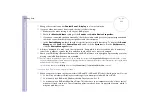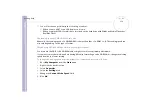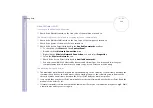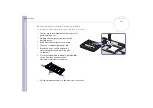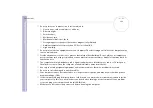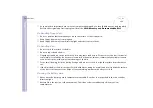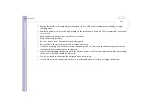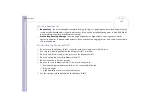
Sony
Notebook U
s
er Guide
Precautions
125
Adding and removing memory*
In the future you may want to change or add memory modules in order to expand the functionality of your
computer. You can increase the memory by installing optional memory modules.
Be careful when changing memory. Mistakes on installation or removal of the memory module may cause a
malfunction.
For memory upgrades, use only DDR266 DDR-SDRAM SO-DIMM (gold leaf contacts).
Electrostatic discharge can damage electronic components. Before touching a memory expansion board,
ensure the following:
❑
Handle the memory module gently.
❑
The procedures described in this document assume familiarity with the general terminology associated
with personal computers and with the safety practices and regulatory compliance required for using and
modifying electronic equipment.
❑
Disconnect the system from its power source (that is, battery or AC adapter) and from any
telecommunication links, networks, or modems before you open the system. Failure to do so may result
in personal injury or equipment damage.
❑
Electrostatic Discharge (ESD) can damage memory modules and other components. Install the memory
Module only at an ESD workstation. If such a station is not available, do not work in a carpeted area, and
do not handle materials that produce or hold static electricity (cellophane wrappers, for example).
Ground yourself by maintaining contact with an unpainted metal portion of the chassis while
performing the procedure.
❑
Do not open the memory module package until you are ready to change the module. The package
protects the module from ESD.
!
Use the special bag delivered with the memory module or wrap the module in aluminium foil to protect it from electrostatic discharge.
Introducing any liquids or any foreign substances or objects into the memory slots, or other internal components of the computer, will result in damage
to the computer and any repairs will be out of warranty.

